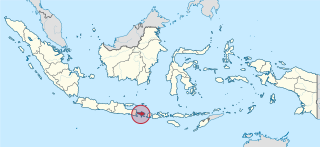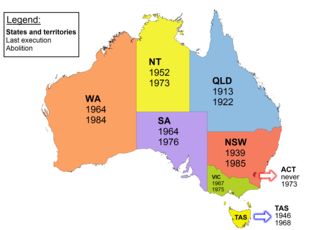Related Research Articles

Bali is a province of Indonesia and the westernmost of the Lesser Sunda Islands. East of Java and west of Lombok, the province includes the island of Bali and a few smaller offshore islands, notably Nusa Penida, Nusa Lembongan, and Nusa Ceningan to the southeast. The provincial capital, Denpasar, is the most populous city in the Lesser Sunda Islands and the second-largest, after Makassar, in Eastern Indonesia. The upland town of Ubud in Greater Denpasar is considered Bali's cultural centre. The province is Indonesia's main tourist destination, with a significant rise in tourism since the 1980s. Tourism-related business makes up 80% of its economy.

The Eighth Amendment to the United States Constitution protects against imposing excessive bail, excessive fines, or cruel and unusual punishments. This amendment was adopted on December 15, 1791, along with the rest of the United States Bill of Rights. The amendment serves as a limitation upon the state or federal government to impose unduly harsh penalties on criminal defendants before and after a conviction. This limitation applies equally to the price for obtaining pretrial release and the punishment for crime after conviction. The phrases in this amendment originated in the English Bill of Rights of 1689.
Shunning can be the act of social rejection, or emotional distance. In a religious context, shunning is a formal decision by a denomination or a congregation to cease interaction with an individual or a group, and follows a particular set of rules. It differs from, but may be associated with, excommunication.
Life imprisonment is any sentence of imprisonment for a crime under which convicted criminals are to remain in prison for the rest of their natural lives. Crimes that warrant life imprisonment are usually violent and/or dangerous. Examples of crimes that result in life sentences are murder, torture, terrorism, child abuse resulting in death, rape, espionage, treason, drug trafficking, drug possession, human trafficking, severe fraud and financial crimes, aggravated criminal damage, arson, hate crime, kidnapping, burglary, and robbery, piracy, aircraft hijacking, and genocide.
A peremptory norm is a fundamental principle of international law that is accepted by the international community of states as a norm from which no derogation is permitted.

Sing Sing Correctional Facility, formerly Ossining Correctional Facility, is a maximum-security prison operated by the New York State Department of Corrections and Community Supervision in the village of Ossining, New York. It is about 30 miles (48 km) north of New York City on the east bank of the Hudson River. It holds about 1,700 inmates and housed the execution chamber for the State of New York until the abolition of capital punishment in New York in 1977.

Legong: Dance of the Virgins is a 1935 drama travelogue silent film, one of the last feature films shot using the two-color Technicolor process, and one of the last silent films shot by a major Hollywood studio. It is a drama based on a Balinese native tale, with travelogue elements depicting Balinese culture. Legong and the follow-up travelogue drama Kliou, the Killer were the last mainstream silent films to be released in the US.
Lynne Irene Stewart was an American defense attorney who was known for representing controversial, famous defendants. She herself was convicted on charges of conspiracy and providing material support to terrorists in 2005, and sentenced to 28 months in prison. Her felony conviction led to her being automatically disbarred. She was convicted of helping pass messages from her client Sheikh Omar Abdel-Rahman, an Egyptian cleric convicted of planning terror attacks, to his followers in al-Gama'a al-Islamiyya, an organization designated as a Foreign Terrorist Organization by the United States Secretary of State.

José Alberto Cabranes is an American lawyer who serves as a senior United States circuit judge of the United States Court of Appeals for the Second Circuit and a former presiding judge of the United States Foreign Intelligence Surveillance Court of Review ("FISCR"). Formerly a practicing lawyer, government official, and law teacher, he was the first Puerto Rican appointed to a federal judgeship in the continental United States (1979).

Nyepi is a Balinese "Day of Silence" that is commemorated every Isakawarsa according to the Balinese calendar. It is a Balinese celebration mainly celebrated in Bali, Indonesia.
Harmelin v. Michigan, 501 U.S. 957 (1991), was a case decided by the Supreme Court of the United States under the Eighth Amendment to the United States Constitution. The Court ruled that the Eighth Amendment's Cruel and Unusual Punishment Clause allowed a state to impose a life sentence without the possibility of parole for the possession of 672 grams (23.70 oz) of cocaine.

Capital punishment in Australia was a form of punishment in Australia that has been abolished in all jurisdictions. Queensland abolished the death penalty in 1922. Tasmania did the same in 1968. The Commonwealth abolished the death penalty in 1973, with application also in the Australian Capital Territory and the Northern Territory. Victoria did so in 1975, South Australia in 1976, and Western Australia in 1984. New South Wales abolished the death penalty for murder in 1955, and for all crimes in 1985. In 2010, the Commonwealth Parliament passed legislation prohibiting the re-establishment of capital punishment by any state or territory. Australian law prohibits the extradition or deportation of a prisoner to another jurisdiction if they could be sentenced to death for any crime.

The Vandalism Act 1966 is a statute of the Parliament of Singapore that criminalizes a number of different acts done in relation to public and private property, namely, stealing, destroying or damaging public property; and, without the property owner's written consent, writing, drawing, painting, marking or inscribing on property; affixing posters, placards, etc., to the property; and suspending or displaying on or from the property any flag, banner, etc.

The Martens Clause is an early international law concept first introduced into the preamble of the 1899 Hague Convention II – Laws and Customs of War on Land. There are differing interpretations of its significance on modern international law, with some scholars simply treating the clause as a reminder international customary law still applies after a treaty is ratified while others take a more expansive approach where the clause provides that because international treaties cannot be all encompassing, states cannot use that as a justification for an action.
The legal system of Ukraine is based on civil law, and belongs to the Romano-Germanic legal tradition. The main source of legal information is codified law. Customary law and case law are not as common, though case law is often used in support of the written law, as in many other legal systems. Historically, the Ukrainian legal system is primarily influenced by the French civil code, Roman Law, and traditional Ukrainian customary law. The new civil law books were heavily influenced by the German Bürgerliches Gesetzbuch.

In Nigeria, Sharia has been instituted as a main body of civil and criminal law in twelve Muslim-majority states since 1999, when then-Zamfara State governor Ahmad Sani Yerima began the push for the institution of Sharia at the state level of government. A "declaration of full Sharia law" was made in the twelve states in that year, and the states created Islamic legal institutions such as a Sharia Commission, and Zakat Commission, and a hisbah, i.e. "a group expected to promote Islamic virtue, whilst discouraging vice". According to some critics, the adoption of Sharia law violates Article 10 of the Nigerian constitution guaranteeing religious freedom.
Marvin Earle Frankel was an American lawyer who served as a United States district judge of the United States District Court for the Southern District of New York. He was also a professor at Columbia Law School and a legal scholar whose views helped to establish sentencing guidelines for the federal courts.

Pura Ulun Danu Batur is a Hindu Balinese temple located on the island of Bali, Indonesia. As one of the Pura Kahyangan Jagat, Pura Ulun Danu Batur is one of the most important temples in Bali which acted as the maintainer of harmony and stability of the entire island. Pura Ulun Danu Batur represents the direction of the North and is dedicated to the god Vishnu and the local goddess Dewi Danu, goddess of Lake Batur, the largest lake in Bali. Following the destruction of the original temple compound, the temple was relocated and rebuilt in 1926. The temple, along with 3 other sites in Bali, form the Cultural Landscape of Bali Province which was inscribed as a World Heritage Site by UNESCO in 2012.

Yong Vui Kong v. Public Prosecutor was a seminal case decided in 2010 by the Court of Appeal of Singapore which, in response to a challenge by Yong Vui Kong, a convicted drug smuggler, held that the mandatory death penalty imposed by the Misuse of Drugs Act ("MDA") for certain drug trafficking offences does not infringe Articles 9(1) and 12(1) of the Constitution of Singapore.

The Royal Court is the principal and oldest court in Jersey, and exercises both criminal and civil jurisdiction. It can sit in a number of configurations, depending on the type of case and the powers to be exercised.
References
- 1 2 Belford, Aubrey (12 October 2010). "Customary Law Revival Neglects Some Balinese". The New York Times . Retrieved 12 October 2010.